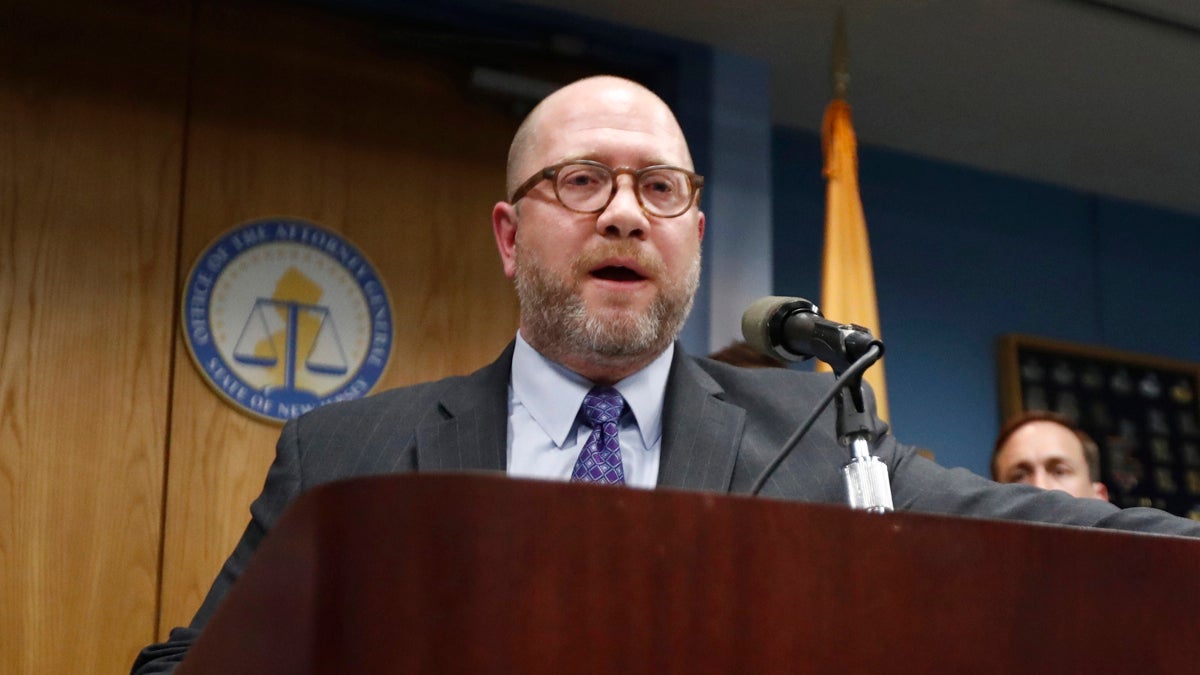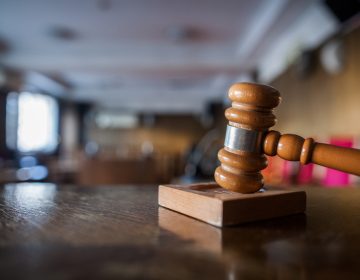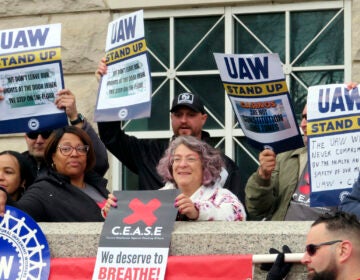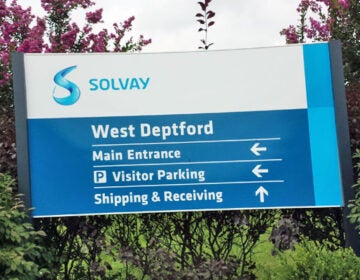Pharma, medical groups blast N.J. push to limit compensation to doctors
In a new push to fight the opioid crisis, New Jersey state officials are trying to stop the flow of legal but highly addictive painkillers at the source: doctors.

Former New Jersey Attorney General Christopher Porrino. (Julio Cortez/AP Photo, file)
In a new push to fight the opioid crisis, New Jersey officials are trying to stop the flow of legal but highly addictive painkillers at the source: doctors.
A proposed rule change by N.J. Attorney General Christopher Porrino would restrict the amount of money and other compensation drug companies can give out to doctors and other prescribers.
In doing so, state officials hope medical professionals will feel less pressure to prescribe opioids created and sold by the same companies that ply them with gifts and food.
But at a Thursday public hearing in Newark, representatives of the state’s pharmaceutical and medical industries criticized the potential rule change, questioning why it would apply to all drugs and claiming it would damage patient care and drive providers out of state.
“That’s not a good result for patients, for our state’s life sciences community, for health care professionals, or for New Jersey’s economy,” said Dean Paranicas, president of the HealthCare Institute of New Jersey, which represents biopharmaceutical and medical technology companies.
Paranicas and others also predicted that the new restrictions would make it harder for pharmaceutical companies to hire doctors to run clinical trials, forcing that industry to shift to other markets, too.
Potential changes
Porrino’s proposal is two-pronged. First, it would set limits on how much doctors and other medical professionals could be paid for certain work or be given in the form of meals.
An individual prescriber would be allowed to accept only $10,000 per year for “bona fide services,” which include speaking engagements, sitting on advisory boards, and consulting. Prescribers could accept just four free meals annually valued at $15 or less.
The proposal would also ban prescribers entirely from accepting certain gifts from drug companies that may have been permitted in the past — such as cash, entertainment, and gift cards.
There are exceptions to the rule. There would be no limit on free materials directly benefiting patients, such as medication samples and anatomical models used in exam rooms. Doctors could also exceed the $10,000 cap for speaking at continuing-education classes.
“We want doctors in New Jersey to make prescribing decisions based only on what’s in the best interest of their patients,” said Porrino, in an interview, “not based on meals that may be provided or compensation that might be provided by pharma companies.”
The amount of money at issue is not insignificant. In 2016 alone, New Jersey doctors received $69 million from drug and device manufacturers, according to the attorney general’s office.
Second opinions
Much of the testimony during Thursday’s public hearing, largely by representatives of the state’s biopharmaceutical and medical research industries, opposed the plan. Yet most speakers praised Porrino and the Christie administration for trying to beat back the opioid crisis.
Among the criticisms of the proposal: companies selling drugs other than opioids would be included; doctors would be restricted from participating in clinical trials; physicians would not be able to report back to drugmakers about how medications are working on their patients; and researchers would abandon New Jersey for other states.
“Overall I think the proposal is well intentioned but too broad in its application,” said Larry Downs, CEO of the Medical Society of New Jersey, which represents doctors.
Downs lauded the administration’s goal of limiting the influence of drugmakers on medical decision making, but predicted that the rule would impede doctors from participating in trials, consultancies and events genuinely aimed at improving patient care.
“We would ask that a much narrower rule be proposed that would really get at the sources of real influence, like out-and-out gifts,” he said.
Other efforts
The rule change is among a grab bag of strategies employed by the Christie administration to fight the opioid crisis and punish those responsible for overprescribing painkillers and illegally selling heroin on the street.
On Thursday, Porrino announced the state’s move to revoke the license of a Warren County doctor who prescribed Subsys, a fentanyl painkiller, to patients who did not meet the federal criteria to receive it, state officials said. Dr. Kenneth P. Sun also allegedly accepted more than $136,000 from Insys Therapeutic Inc., the pharmaceutical company that makes Subsys.
Porrino’s complaint alleges that Sun received those payments in exchange for prescribing the drug.
(Earlier this month the state filed a lawsuit against Insys, claiming the company marketed Subsys to a wider customer base than was permitted by the Food and Drug Administration.)
The Christie administration has also tightened the rules on prescribing opioids and created a statewide database to track patients who are try to abuse prescription painkillers.
WHYY is your source for fact-based, in-depth journalism and information. As a nonprofit organization, we rely on financial support from readers like you. Please give today.




